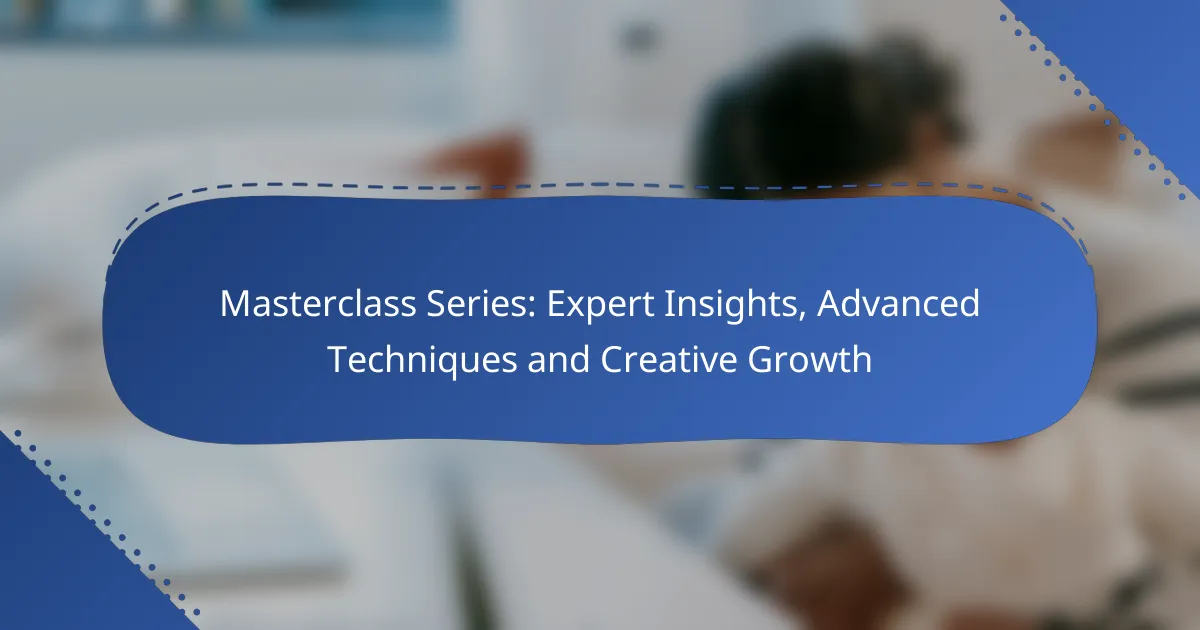The Masterclass Series offers an opportunity to delve into advanced techniques and creative growth strategies through insights from industry experts. Participants will engage with expert interviews and case studies, gaining practical knowledge that enhances their skills and fosters innovation. This series not only boosts creativity but also provides valuable networking opportunities and access to specialized content for professional development.

What are the key insights from the Masterclass Series?
The Masterclass Series provides valuable insights into advanced techniques and creative growth strategies from industry experts. Participants gain practical knowledge through expert interviews, case studies, and best practices that can be applied to enhance their skills and drive innovation.
Expert interviews
Expert interviews in the Masterclass Series feature seasoned professionals sharing their experiences and insights. These discussions often reveal unique approaches to problem-solving and innovation that can inspire participants to think differently in their own work.
Listening to these experts can help identify emerging trends and effective strategies in various fields. For instance, an expert in digital marketing might discuss the importance of data analytics in shaping successful campaigns.
Case studies
Case studies provide real-world examples of how theories and techniques are applied in practice. They illustrate the challenges faced by organizations and the solutions implemented to overcome them, offering a practical perspective on success.
For example, a case study on a startup’s growth strategy might highlight how they leveraged social media to build brand awareness and engage with customers effectively. Analyzing such cases helps participants understand the nuances of decision-making in different contexts.
Best practices
Best practices outlined in the Masterclass Series serve as guidelines for achieving optimal results in various disciplines. These practices are often derived from the collective experiences of experts and successful organizations.
Key best practices might include maintaining a customer-centric approach, regularly evaluating performance metrics, and fostering a culture of continuous learning. Implementing these strategies can significantly enhance productivity and innovation.
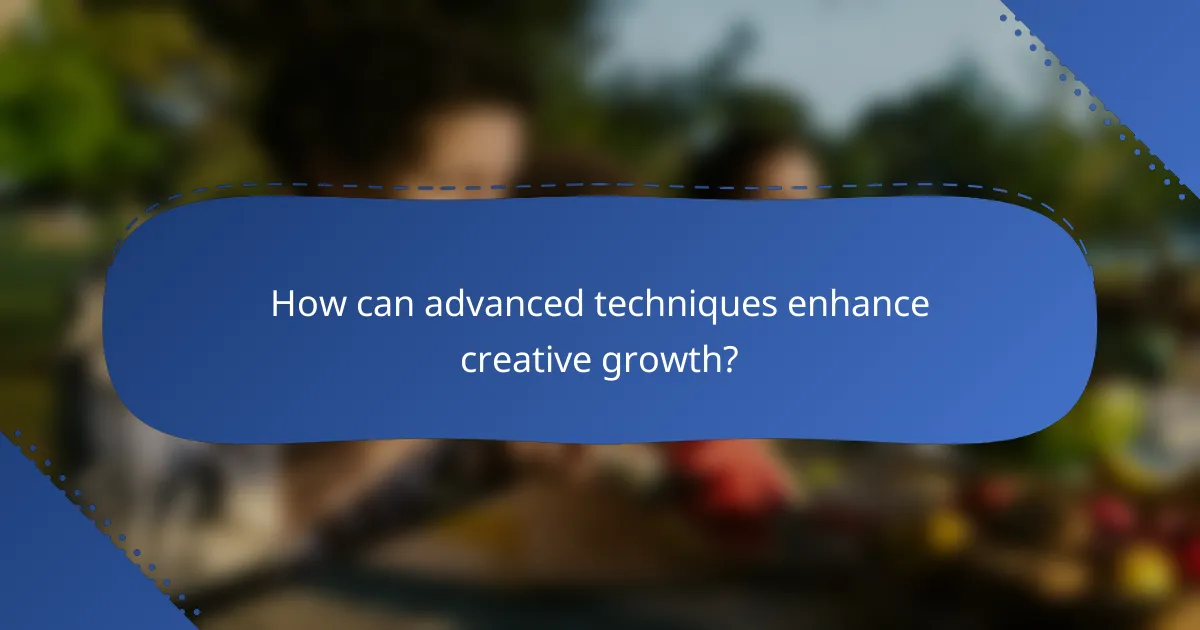
How can advanced techniques enhance creative growth?
Advanced techniques can significantly boost creative growth by providing structured approaches to idea generation and decision-making. By leveraging innovative methods, data insights, and collaboration tools, individuals and teams can unlock new levels of creativity and efficiency.
Innovative brainstorming methods
Innovative brainstorming methods, such as mind mapping and reverse brainstorming, encourage diverse thinking and problem-solving. Mind mapping visually organizes ideas, allowing participants to see connections and explore new directions. Reverse brainstorming, on the other hand, focuses on identifying potential problems or obstacles, which can lead to more robust solutions.
To implement these techniques effectively, set clear objectives and create a supportive environment where all ideas are welcomed. Consider using digital tools like Miro or Lucidchart to facilitate remote brainstorming sessions.
Data-driven decision making
Data-driven decision making enhances creative growth by grounding ideas in evidence and insights. By analyzing trends, user feedback, and performance metrics, creative professionals can make informed choices that align with audience needs and market demands. This approach minimizes risks and maximizes the potential for successful outcomes.
Utilize analytics tools like Google Analytics or Tableau to gather and interpret data. Regularly review key performance indicators (KPIs) to adjust strategies and ensure that creative efforts are on track. Aim for a balance between intuition and data to foster innovation.
Collaboration tools
Collaboration tools streamline communication and project management, making it easier for teams to work together creatively. Platforms like Slack, Trello, and Asana facilitate real-time collaboration, allowing team members to share ideas, track progress, and provide feedback efficiently.
When selecting collaboration tools, consider the specific needs of your team and the nature of your projects. Ensure that all members are trained on the tools to maximize their effectiveness. Regular check-ins and updates can help maintain momentum and foster a collaborative culture.
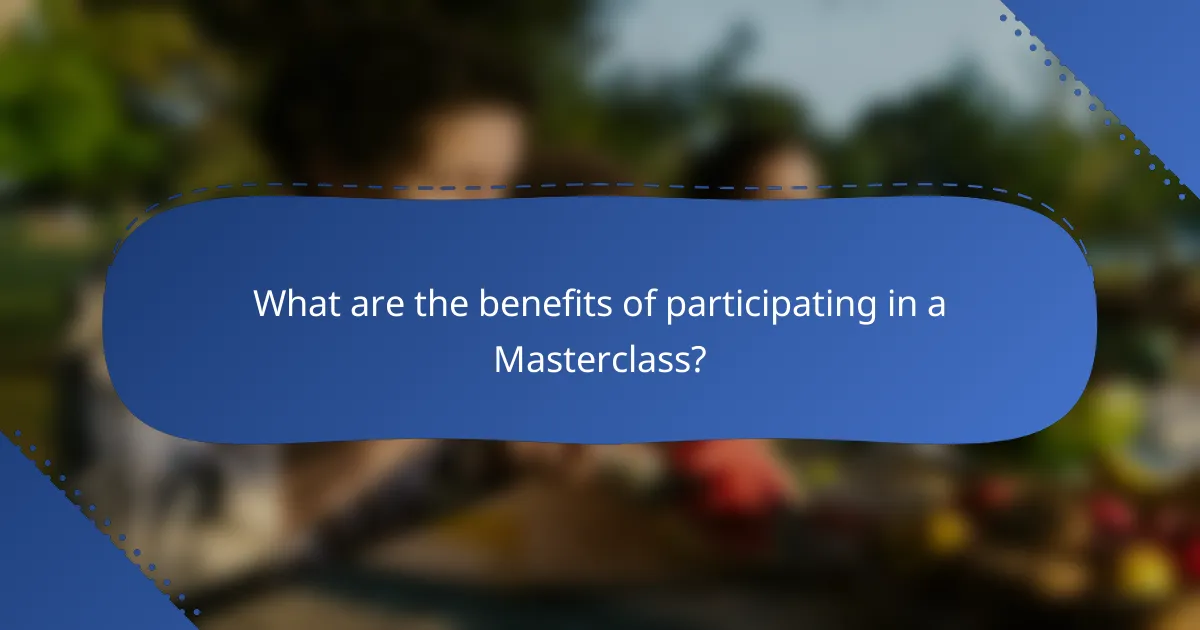
What are the benefits of participating in a Masterclass?
Participating in a Masterclass offers numerous advantages, including enhanced skills, valuable networking, and exclusive access to specialized content. These benefits can significantly boost your creative growth and professional development.
Networking opportunities
Masterclasses provide a unique platform for connecting with industry experts and fellow participants. Engaging with like-minded individuals can lead to collaborations, mentorships, and lasting professional relationships.
To maximize networking, actively participate in discussions and follow up with contacts after the class. Consider joining related online communities to maintain these connections and expand your network further.
Skill enhancement
One of the primary benefits of a Masterclass is the opportunity to enhance your skills through expert instruction. Participants can learn advanced techniques and receive personalized feedback, which can accelerate their learning process.
When choosing a Masterclass, consider your current skill level and the specific areas you wish to improve. Look for classes that offer practical exercises and real-world applications to ensure you gain hands-on experience.
Access to exclusive content
Masterclasses often provide exclusive resources, such as video tutorials, downloadable materials, and insider tips that are not available elsewhere. This content can deepen your understanding and provide a competitive edge in your field.
Take advantage of these resources by reviewing them thoroughly and applying what you learn in your own projects. Keep an eye out for follow-up materials or additional sessions that may further enhance your learning experience.
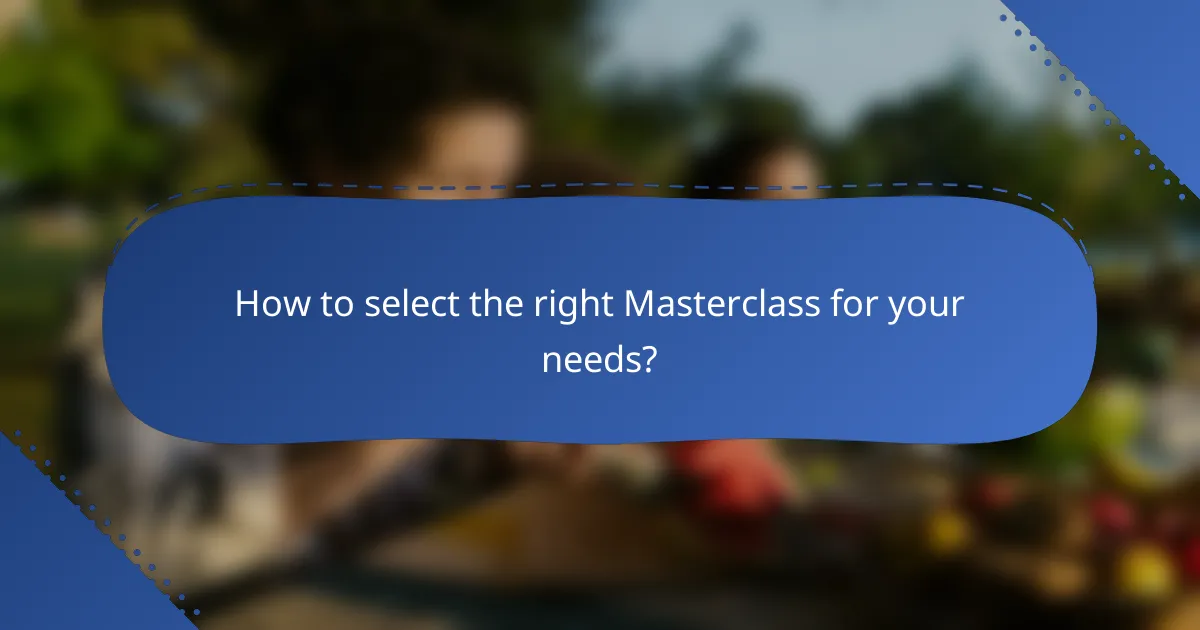
How to select the right Masterclass for your needs?
Selecting the right Masterclass involves understanding your personal goals, the expertise of instructors, and the quality of course content. Consider what skills you want to develop and how each Masterclass aligns with those objectives.
Assessing expertise of instructors
Evaluating the expertise of instructors is crucial when choosing a Masterclass. Look for instructors with a proven track record in their field, such as published authors, industry leaders, or award-winning professionals. Their background can significantly influence the quality of the learning experience.
Check their credentials, experience, and previous student outcomes. A strong instructor often has testimonials or case studies showcasing their impact on past participants. This can help you gauge their effectiveness in teaching and mentoring.
Evaluating course content
Course content should align with your learning objectives and provide practical insights. Review the syllabus to ensure it covers relevant topics and includes hands-on projects or assignments that reinforce learning. Look for courses that offer a balance of theory and practical application.
Consider the format of the content as well. Video lectures, interactive sessions, and downloadable resources can enhance your learning experience. Ensure the course is up-to-date with current trends and practices in the industry.
Understanding participant feedback
Participant feedback is a valuable resource for assessing the quality of a Masterclass. Look for reviews and ratings on platforms where the course is offered. High ratings and positive comments often indicate a beneficial learning experience.
Pay attention to specific feedback regarding the instructor’s teaching style, course materials, and overall satisfaction. This can provide insights into what you can expect and help you avoid courses that may not meet your needs.
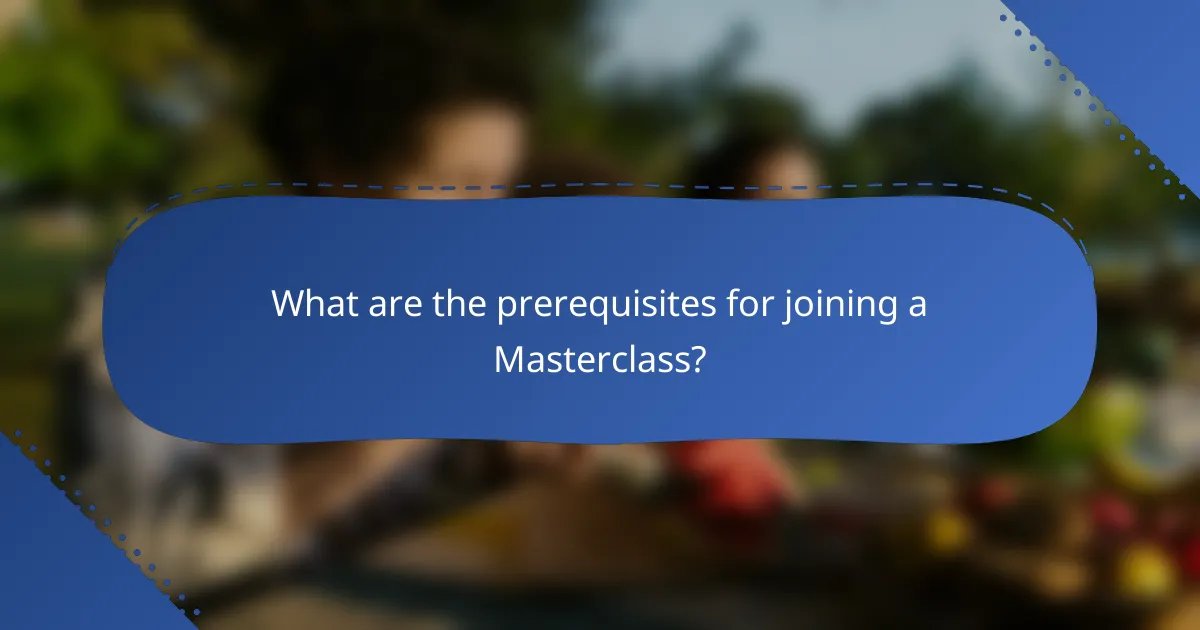
What are the prerequisites for joining a Masterclass?
To join a Masterclass, participants typically need a foundational understanding of the subject matter, relevant technical skills, and a commitment of time to engage fully with the course content. These prerequisites ensure that attendees can maximize their learning experience and apply advanced techniques effectively.
Basic knowledge requirements
Basic knowledge requirements vary by Masterclass but generally include a fundamental grasp of the topic being taught. For instance, if the Masterclass focuses on cooking, participants should have basic culinary skills and familiarity with kitchen tools. This foundational knowledge allows for a smoother learning process and deeper engagement with advanced concepts.
Before enrolling, review the course description to identify any specific prerequisites mentioned. This can help you gauge whether your current knowledge aligns with the expectations of the Masterclass.
Technical skills needed
Technical skills required for a Masterclass depend on the subject area. For example, a Masterclass in digital marketing may require familiarity with analytics tools and social media platforms, while a photography class might necessitate proficiency in using a camera and editing software. Assess your current skill set against the course requirements to determine your readiness.
It’s beneficial to have hands-on experience with relevant tools or software before starting. This preparation can enhance your ability to follow along with practical exercises and apply new techniques effectively.
Time commitment
Time commitment for a Masterclass can range from a few hours to several weeks, depending on the course structure and depth of content. Most Masterclasses include a combination of live sessions, recorded lectures, and assignments that require dedicated time for completion. Be prepared to allocate sufficient time each week to fully engage with the materials and participate in discussions.
Consider your schedule and other commitments before enrolling. A realistic assessment of your availability will help you manage your time effectively and ensure that you can benefit from the Masterclass experience without feeling overwhelmed.
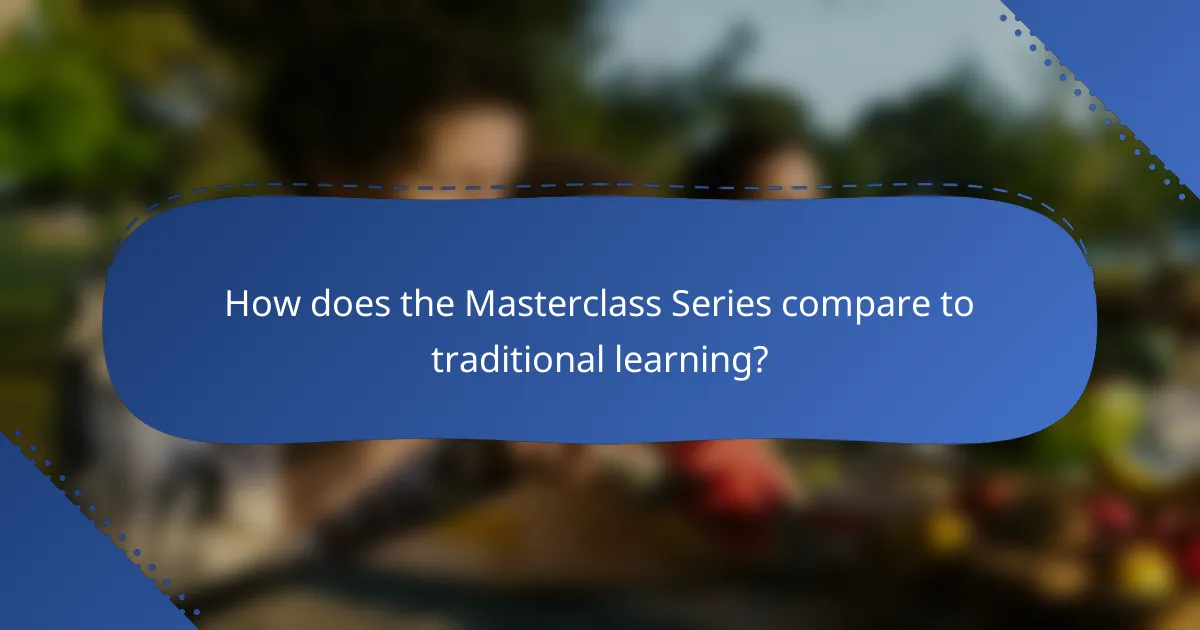
How does the Masterclass Series compare to traditional learning?
The Masterclass Series offers a more personalized and flexible approach to learning compared to traditional educational methods. While traditional learning often follows a fixed curriculum and schedule, Masterclass allows learners to engage with expert instructors at their own pace, focusing on specific skills and creative growth.
Flexibility of learning
The Masterclass Series provides unparalleled flexibility, allowing learners to access courses anytime and anywhere. This self-paced format enables individuals to fit learning into their busy schedules, whether they are working professionals or students.
For example, a user can watch a lesson during a lunch break or on weekends, making it easier to balance education with other responsibilities. This contrasts with traditional learning, which typically requires attendance at set times and locations.
Real-world application
Masterclass emphasizes practical skills that can be directly applied in real-world scenarios. Each course is designed by industry experts who share their insights and techniques, ensuring that learners gain relevant knowledge that can enhance their careers or personal projects.
For instance, a cooking class taught by a renowned chef will not only cover recipes but also delve into culinary techniques and industry secrets, providing learners with actionable skills they can use immediately. Traditional learning often focuses more on theoretical knowledge, which may not always translate to practical application.
Peer interaction
While traditional learning often fosters in-person interaction, Masterclass offers a different kind of community through online forums and discussion groups. Learners can connect with peers from around the world, sharing insights and feedback on their progress.
This global network allows for diverse perspectives and collaborative learning, which can enhance the educational experience. However, it may lack the immediacy of face-to-face interactions found in traditional classrooms, so participants should actively engage in discussions to maximize their learning.
